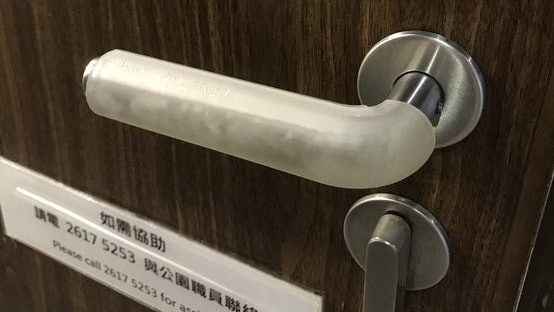The Omicron epidemic has entered the Hong Kong community, and there are hidden concerns of invisible transmission.
The Hong Kong Polytechnic University has developed an anti-virus plastic material that can kill more than 90% of the novel coronavirus on the surface within 10 minutes, as well as instantly kill most common bacteria and viruses, with a validity period of at least three years.
The team has conducted field trials in the past year, and made the material into used clothes recycling bin handles, toilet door handle protectors, elevator buttons and Braille boards, etc., to prove that the material has stable anti-virus and bacteria performance, and hopes to be extended to restaurant seating in the future. separate rubber sheets, unmanaged "three-nil buildings", primary and secondary school campuses and public transport systems, etc.
+3
PolyU's interdisciplinary research team, which received a funding of RMB 1.95 million from the Innovation and Technology Commission earlier, has developed the world's first "anti-virus 3D printing material" that can kill the surface novel coronavirus and most common viruses and bacteria since the middle of last year. It is resin, adding anti-viral ingredients such as cationic compounds, through 3D printing, the material is evenly distributed, which can pierce the virus cell membrane, destroy its structure, and achieve the effect of killing viruses and bacteria.
According to the research team, laboratory tests have confirmed that the anti-virus rate of the material reaches 90% within 10 minutes, and almost all viruses and bacteria on the surface can be killed within 20 minutes.
The team is patenting this technology and it will be used commercially.
Has been used in handles, elevator buttons, braille boards, etc.
The research team pointed out that through three-dimensional printing technology, the material can be made into different shapes and widely used in public facilities.
In the past year, the team has worked with the Home Affairs Department, Hong Kong Wetland Park and environmental groups to make materials into used clothes recycling bin handles, toilet door handle protectors, elevator buttons and Braille boards.
Taking the handle of the recycling box as an example, no damage has been seen after nearly one year of use, and no new coronavirus, Escherichia coli and Staphylococcus aureus have been detected on the surface. began to gradually weaken over the years.
PolyU was also invited by the Sham Shui Po District Office to use newly developed materials to make door handle protective covers for over 100 "three-nil" buildings that lack management in the district, and install them on the doors where residents often come and go, reducing the cost. Risk of virus transmission in buildings.
PolyU hopes to apply the material to primary and secondary school campuses, healthcare facilities and public transport systems.
The research team pointed out that because the material destroys viruses by physical principles, that is, positively charged cations can tear the surface walls of bacteria and viruses, even if the virus is mutated, the same effect can still be exerted; in addition, the disinfection component of the material is embedded rather than coated. Even if it is polished with sandpaper and cleaned with disinfectant such as bleach, it will not damage its anti-virus performance.
The material has passed the antibacterial test of accelerated aging samples, and it is still effective after 60 months of use, but it is recommended to replace it after three years of use, but it cannot kill non-enveloped viruses, such as enteroviruses.
▼Hong Kong under the ravages of Omicron▼
+6
Low cost and mass production by injection molding
Lu Junyu, an associate professor of PolyU's Department of Textiles and Clothing, who led the team, explained that the cost of elevator buttons is about 10 yuan, which is relatively cheap and quick to make. 8 to 10 buttons can be made in 10 minutes, and a handle cover costs about tens of yuan. It can be mass-produced by injection molding.
He pointed out that even if the material is used, it still needs to be combined with daily cleaning, but the cleaners no longer need to use strong disinfectants or antibacterial agents to clean multiple times a day, and he also revealed that the restaurant's partition rubber sheet can be mass-produced and launched into the market sooner.
Omicron Incidence Prediction︱PolyU: Tai Po, Tuen Mun, and more than 5 districts will be on the list in the next week and more than 5 districts in the next week Animals are returned to human national security education | PolyU Teng Jinguang: Chinese history and culture will be a compulsory course from the next academic year

